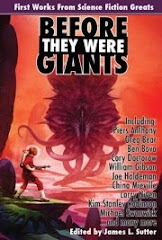Another incomplete reading update. Since the last update I did what I normally don't do and read the same book every time I had a chance to read, no matter the location. This way I finished Ceres Storm by David Herter and I got to page 285 in A Tramp Abroad by Mark Twain. There it said END OF VOL. I. So, I've decided to put it aside for now and read VOL II, the second half of the book, at a later date.
As threatened, on our drive to Asheville to visit the in-laws we listened to A History of the English Language by Michael Drout. We only made it half way through the fourth lesson (of 14) but everyone is enjoying it. I missed the beginning of this conversation, so I don't know how it came up, but it was gratifying to hear my seven year old son explain to his grand father that the Japanese use three alphabets. So he is picking some of this up as well.
We arrived in Asheville Tuesday evening. After eating out we were driving back to house when my father in-law took some back roads that brought us into the back entrance of a shopping center. This shopping center had a book store that was not here the last time we visited. I had not planned on doing any book shopping until Friday, but it was about 8:15 and book store was open. I had them drop me off and leave me there (which, believe me, seemed perfectly normal to everyone). After taking everyone else back to the house my father in-law had to run back out to get something and then he picked me up at 9:00. Luckily the store is only about a mile from their house.
The store in question is Mr. K's. For those of you who have book shopped in Nashville, Knoxville or Chattanooga, TN, this store is remarkably like the McKay's you have there, just smaller. I didn't find very much that I was actively looking for, but I did buy: The Grand Wheel by Barrington J. Bayley, Brand of the Werewolf and Lost Oasis (Doc Savage books 4 and 5), Orbital Decay by Allen Steele and Lost Continents: The Atlantis Theme in History, Science and Literature by L. Sprague de Camp.
On Friday I made it to the Holy Grail of book stores in Asheville, Downtown Books & News. I love this store because paperbacks are 1/2 cover price, even the old 35 cent paperbacks. I bought The Triumph of Time by James Blish and Station in Space by James Gunn, both for 18 cents. Doctor to the Stars by Murray Leinster for 20 cents and Bettyann by Chris Nevile for 38 cents. Bette Farmer was good friends with Chris' wife Lil, and she has asked me a few times over the years if I had ever read anything by him. Now I'll get the chance. I also bought a trade paperback of Off the Wall at Callahans's by Spider Robinson. This is a collection of quotes from the series and might just be the perfect bathroom book. I also bought a trade paperback of The Anubis Gate by Tim Powers, which comes highly recommended by Win Scott Eckert.
My next stop was Books by Linda. I've been here before and didn't have high hopes as it has a very small science fiction section (a fraction of the size of the romance section) but I did get lucky and find Earth Invader by Randall Garrett. I've only read his Lord Darcy series and the short story collection, The Best of Randall Garrett but he is an old friend of Phil Farmer's (he actually lived with them for a while) and I'm always looking for his older books.
Overall the book hunting was ok. Having been through the same stores around Atlanta over and over I was really looking forward to visiting stores I haven't been to in a couple of years. If I'm lucky there is another store or two that we might hit on the way back to Atlanta this afternoon.
Which of these will I start reading when I get back home? I have three slots to fill and no idea where I'm going to start. It might not even be any of these as I still have plenty of books at home I can't wait to read.

